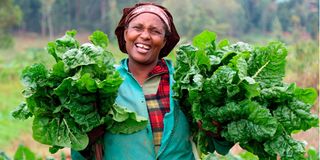Empower women at the grassroots to fast-track growth

Mary Muthoni harvests spinach at her farm in Kiawaithanji village in Nyeri County on October 13, 2021. Today marks the International Day of Rural Women, a day that gives us a chance to celebrate rural women's accomplishments in their families and communities.
What you need to know:
- Kenya has to take a progressive step forward in achieving gender parity and create a positive impact on health, education and livelihood of communities.
- It needs to address the patriarchal and patrilineal traditions ingrained in our society and simultaneously create an inclusive environment for every woman to learn, grow and progress, without barriers.
Kenya has made significant strides in gender equality over the years, yet women in the country continue to face numerous challenges. Despite being half of the population, women in Kenya often face discrimination, particularly in rural areas where they are most vulnerable.
Women are significant contributors to the rural economy as wage earners, farmers, and entrepreneurs. Women from indigenous and grassroots communities are frequently considered as the keepers of traditional knowledge, which is an essential part of their society. Yet, these women are restrained from pursuing economic activities due to social norms.
Empowering women at the grassroots means providing them with the necessary resources, tools, and knowledge to take control of their lives and make informed decisions. It involves breaking down the barriers that prevent women from accessing education, healthcare, and economic opportunities.
Based on the 2023 Women, Business and the Law dataset, Kenya's score has shown a consistent increase over the years. This positive trend can be attributed to the implementation of various legislative measures.
Notably, the enactment of laws addressing domestic violence, the prohibition of gender discrimination in employment, and the establishment of equal remuneration for work of equal value have significantly contributed to this improvement.
Sustained growth
Kenya has achieved sustained economic growth, social development, and political stability through significant reforms in recent decades. Gender equality is still a major development challenge.
When women have equal opportunities as men, they join and stay in the workforce, boosting economies and promoting development. Gender equality is linked to improved development outcomes, like reduced vulnerable employment and extreme poverty for women.
When women are empowered, they can actively participate in their communities and contribute to their social and economic development. There are various social barriers for women, which makes it extremely important to educate people on the need for women's empowerment, especially in remote areas.
Kenya’s development needs women’s participation, which can solely be achieved by uplifting them. Women’s contribution to Kenya’s gross domestic product (GDP) is 20 per cent and that is quite low compared to the global average of 37 per cent.
Women do not lack desire or ambition, but several structural and societal restrictions, including gender stereotypes, unequal access to finance, and a lack of family support, are the key reasons for their lesser participation in economic and community affairs.
A key part of women's empowerment is through economic independence and education. This includes the freedom to manage their schedules, finances, and the ability to equally participate in the country’s development. When women earn income, they are more likely to invest in their families' well-being, including education and healthcare.
Education plays a major role in the overall empowerment of women. Educated women are more likely to send their children to school, which can break the cycle of poverty and improve the prospects of future generations. They are also better equipped to advocate for their children's education and to ensure that their children receive a quality education.
Gender sensitivity
In addition, empowering women can lead to an increase in female teachers, educators, and political leaders; those could present Kenya on its world level, as well as help create a more gender-sensitive education system. When women are educated, they are better able to participate in decision-making, including those related to education policy and programming.
Therefore, it would not be wrong to say that education is not just directly proportional to the physical health of women but also their children’s life outcomes. They are also better informed about preventive measures, such as immunisations and prenatal care.
Women's political empowerment can lead to increased participation in decision-making processes and policies that affect their lives and the lives of their communities. This can lead to more inclusive and equitable policies that benefit everyone in the country.
Kenya has acknowledged that empowering women at the grassroots will be central to our efforts to achieving Sustainable Development Goals.
For Kenya to take a progressive step forward in achieving gender parity and create a positive impact on health, education and livelihood of communities, it will need to address the patriarchal and patrilineal traditions ingrained in our society and simultaneously create an inclusive environment for every woman to learn, grow and progress, without barriers.
Indeed! Beyond the commonwealth's core concerns, the nation has achieved significant accomplishments in a variety of areas. However, much more ground has to be covered.
The writer is a veteran journalist and freelance writer based in Brampton, Canada.





